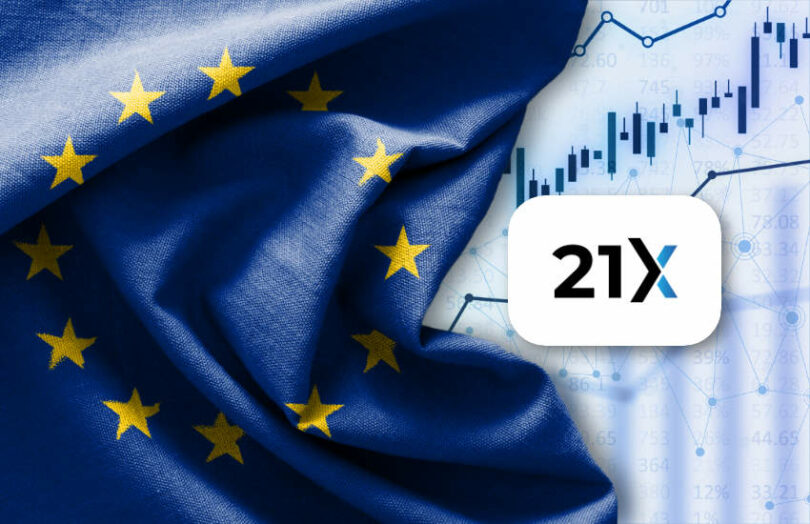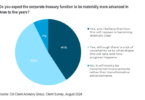21X plans to launch a regulated exchange and settlement system on a permissionless blockchain in Q1 2025, after German regulator BaFin awarded it a DLT Pilot Regime license as a financial market infrastructure (FMI).
This is the first trading and settlement system (TSS) license awarded since the EU’s DLT Pilot Regime came into force in March 2023. It took 18 months of work with BaFin with input from the European Securities and Markets Authority (ESMA) and the European Central Bank (ECB). The first security will likely be a tokenized money market fund. 21X recently partnered with Singapore-based SBI Digital Markets, which will tokenize assets and fund administrator Apex.
Going forward 21X is eyeing digital equity, bonds, funds, ETFs and even real estate.
The novel DLT Pilot Regime
There are several novel aspects to the license award. It allows 21X to operate an on-chain exchange on a public permissionless blockchain (Polygon POS). It replaces a conventional exchange and central securities depository (CSD) with a single smart contract that confirms the trade and exchanges a security for a stablecoin atomically.
Head of Business Development at 21X Severin Kranz told Ledger Insights, “There’s T+1 settlement in the US. We’re moving not to T+0 but T plus a few seconds, all enabled by one smart contract on chain, through tokenized securities and regulated stablecoins.”
Another key innovation is the ability to hold the shareholder registry of an asset on chain without using a central securities depository (CSD). “Most of the assets and the security tokens we’ve seen for now are basically digital twins,” said Mr Kranz. That’s particularly on permissionless chains, less so on permissioned. “Tokenization promised to provide efficiency gains, which haven’t been realized because we didn’t have native tokenization yet.”
The DLT Pilot Regime also allows an exchange to engage directly with retail investors provided they have gone through know your customer (KYC) and anti money laundering (AML) procedures with 21X, which them to an allow list of participants. 21X also plans to work with brokers, financial institutions and corporate treasuries. Investors can self custody their assets.
The smart contract for trading and settlement isn’t your average automated market maker (AMM) which usually involves an algorithm. 21X runs a central limit order book (CLOB) on chain. Trading pairs are between a tokenized asset and specific regulated stablecoins.
21X has two stablecoin partners. One is AllUnity, the firm co-founded by Deutsche Bank’s DWS which has yet to launch. 21X’s chairman Alexander Höptner is AllUnity’s CEO. The other partner is Membrane Finance, the EU issuer recently acquired by Paxos.
Regulated tokenization world firsts
“This is more than just a license – it’s a revolutionary moment for capital markets,” said Max Heinzle, CEO of 21X. “For the first time ever institutional and retail investors can trade and settle tokenized securities on a fully regulated, blockchain-based exchange with the same level of trust, security and compliance as traditional markets.”
He added, “Our special thanks go to the EU and German regulators who have shown visionary leadership in driving this regulation forward.”
While other digital exchanges exist, such as Switzerland’s SDX and Singapore’s ADDX, this is a first. That’s because it combines a permissionless blockchain, with a single license that covers trading and settlement, in combination with the recognition of DLT as the registry and retail investor access. Both SDX and ADDX operate on permissioned chains, and SDX only engages with institutions and has a conventional CSD license. Switzerland has a licensing regime that supports both trading and settlement, but there are currently no license holders.
A multichain strategy
Polygon POS is the chosen chain for launch for a few reasons, including its popularity in Germany for security token issuances. Germany has supportive regulations for the issuance of electronic securities. However, there’s a challenge with secondary markets because of the EU requirements for a separate CSD. Hence, the need for the DLT Pilot Regime.
21X has a multi chain strategy, which is something that the regulator is keen on. One of the concerns that authorities have is what if there’s an issue with the permissionless chain, because 21X doesn’t control it? In order to provide redundancy, the exchange needs to be able to move the tokens to a different chain in the unlikely event of an emergency.
While some of the regulatory requirements may not appeal to die hard cryptocurrency fans, this is the opportunity to prove that permissionless blockchains can safely host regulated securities. “21X is not just building an exchange, we are building the market infrastructure for the future of capital markets on-chain,” said CEO Max Heinzle.






